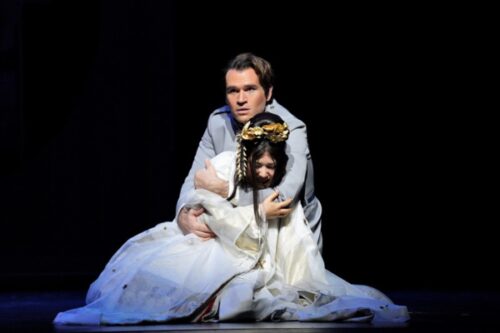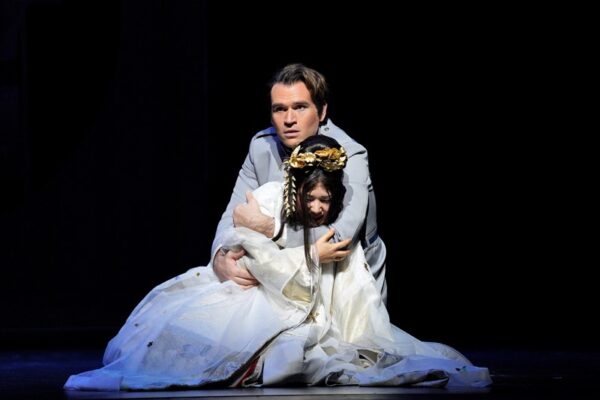 United States Puccini, Madama Butterfly: Soloists, Chorus and Orchestra of San Francisco Opera / Eun Sun Kim (conductor). War Memorial Opera House, San Francisco, 9.6.2023. (HS)
United States Puccini, Madama Butterfly: Soloists, Chorus and Orchestra of San Francisco Opera / Eun Sun Kim (conductor). War Memorial Opera House, San Francisco, 9.6.2023. (HS)

Production:
Director – Amon Miyamoto
Sets – Boris Kudlička
Costumes – Kenzō Takada
Lighting – Fabio Antoci
Projection – Bartek Macias
Chorus director – John Keene
Cast:
Cio-Cio-San – Karah Son
Lt. B. F. Pinkerton – Michael Fabiano
Suzuki – Hyona Kim
Sharpless – Lucas Meachem
Goro – Julius Ahn
Prince Yamadori – Kidon Choi
The Bonze – Jongwon Han
Imperial Commissioner – Andrew Pardini
Kate Pinkerton – Mikayla Sager
Adult Trouble – John Charles Quimpo
Elder Pinkerton – Evan Miles O’Hare
In these racially sensitive times, San Francisco Opera’s staging of Madama Butterfly brings a distinctly Asian perspective to Puccini’s opera. Japanese and Korean names populate the credits, offering insights into the cultural clash at the core of the story. And it does this free of the excessive Japonaiserie that makes so many Butterfly productions hard to watch today.
The co-production had its premiere in 2019 in Tokyo and was seen in 2022 in Dresden. Director Amon Miyamoto frames the story through the eyes of an adult Trouble, the son of the title character. Each scene opens with a silent prelude showing Pinkerton on his deathbed sharing his diary with Trouble, thirty years after the child’s birth.
As Trouble roams the edge of each scene, he sees how his 15-year-old mother wed Pinkerton, a U.S. Naval lieutenant, fell in love with him and, after waiting patiently for him to return, eventually chose suicide.
Miyamoto is no slouch. He won a Tony for directing the 2005 Broadway revival of Stephen Sondheim’s Pacific Overtures, itself a wry look at the culture clashes as Japan opened to the western world in the late-nineteenth century. He has clearly thought about the particulars. For instance, we are meant to see the story unfold through the 60-year-old Pinkerton’s memory. How could Pinkerton know details that happened while he was absent for three years? The presence of Suzuki in his hospital room not only accounts for that but also gives Trouble a Japanese figure to compete against the Pinkertons.
More to the point, seeing things through Trouble’s eyes gives us a different perspective. Even if we remain at a remove from full immersion in the story, I found some of the scenes more moving than usual.
Much credit goes to Puccini’s music, of course. In its third performance at War Memorial Opera House, Eun Sun Kim consistently found the pulse, energy and distinctive sonorities of this familiar score with often revelatory attention to details, getting the most juice out of the orchestra and singers while still making everything unfold naturally.
Miyamoto cannily times much of the action to the music to maximize emotional impact. When Sharpless, the U.S. consul, sees for the first time the boy Butterfly was keeping secret, it coincides perfectly with Puccini’s full-throated musical gesture.
Sets by Boris Kudlička rely on large, flowing curtains and a box-like configuration of the couple’s tiny house. Dressed up with colorful lighting by Fabio Antoci, it rolls around the stage easily (and silently), presenting a different look and context from every direction it faces. Projections on the curtains and back scrims by Bartek Macias bring a cascade of different images — a starry sky for the love duet, a rising sun before Pinkerton’s return, snippets from the diary and swirls that suggest misty memories.
If Kenzō Takada’s costumes sometimes seem out of sync with the rest of the production, one could see them as an example of the culture clash. Other than a summery shift for the Flower Duet, Butterfly’s clothing did not seem to fit. Pinkerton’s robin’s-egg-blue uniform was decidedly not Naval, and why was Yamadori (Butterfly’s suitor when Pinkerton had not returned) dressed like a general on parade?

Standouts in the cast begin with Korean soprano Karah Son and her indefatigable singing in the title role. Other sopranos may find more refinement in the character’s gorgeous entrance music, but Son not only made a believable teenager but caressed Puccini’s melodic lines with finesse. She showed richness in the lower range and delivered ringing high notes. ‘Un bel dì’ was especially fine, its simplicity and subtle rubato making a perfect statement. She has been singing the role around the world, and her comfort with the music paid repeated dividends.
Michael Fabiano, a regular in Romantic-era tenor roles at San Francisco Opera since his 2011 debut as Rodolfo in La bohème, portrayed Pinkerton as clueless rather than actively mean (as some tenors do). His lyric sound and pulsing high notes matched well with Son’s, but his best scenes were with Lucas Meacham’s Sharpless, the well-meaning U.S. consul who cannot get through to either Butterfly or Pinkerton. Meacham’s rock-solid baritone and steadfast stances served the character well and connected with the other singers.
Mezzo-soprano Hyona Kim, who was in the cast for the company’s 2016 Dream of the Red Chamber, invested Suzuki’s music with suppleness. She harmonized nicely with Son in a Flower Duet in which the flowers appeared in projections in response to the singers’ gestures, rather than scattered around the stage. Among the other singers, Julius Ahn’s Goro stood out for a lively tenor and ability to connect smartly with the other characters.
In the end, though, Puccini’s music carries the day. It underlines every moment of storytelling, investing every character with a distinctive aura, always driving the emotional impact. For all the thought and consideration that went into the production, what made this as effective a Butterfly as any I have seen was the conducting by Eun Sun Sum. She continues to go from one triumph to another with this company.
Harvey Steiman
